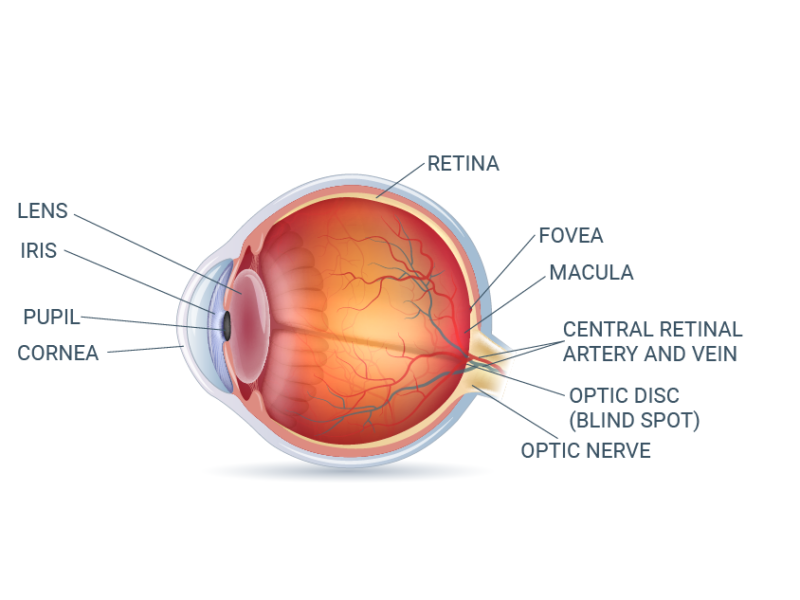Welcome to Our Patient Education Library!
We invite you to explore our comprehensive list of resources and educational materials designed to help educate you about retinal and ophthalmic conditions and treatments. Click on a topic below to learn more!
Understanding Your Eyes: Anatomy

The Lens:
The Vitreous:
The Retina:
The Macula:
The Fovea:
Educational Topics:
- Cataract Surgery - Retained Lens Material
- Central Serous Retinopathy - Inner Eye Condition
Corneal abrasions and injuries are common. Your cornea is located at the front of your eye. It may be scratched or injured by substances, such as dirt, sand, or chemicals. Contact lenses or ultraviolet light may harm the cornea. Puncture
... Read More - Diabetic Retinopathy
- Epiretinal Membrane or Macular Pucker
Dry eyes are a common condition. Dry eyes occur when your eyes do not produce enough tears to keep them moist. This may happen under certain circumstances, such as from side effects of some medications or being in a dry
... Read More - Endophthalmitis - Inner Eye Infection
Eye allergies are usually more annoying than they are dangerous. Eye allergies are common. In fact, about 50% of people with general allergies experience eye allergies. In many cases, over-the-counter medications can help relieve itchy watery eyes. However, if your
... Read More - Eye Injury
The eye can be injured quite easily. Trauma may result from cuts, scratches, penetration, debris, light, chemicals, and blunt forces. Except for the most trivial injuries, eye trauma needs immediate professional evaluation and treatment. Untreated eye trauma may lead to
... Read More - Eye Tumors
Tumors inside of the eye, referred to as intraocular tumors, are composed of cells that grow abnormally and create a mass. There are many types of eye tumors. Eye tumors can be benign or malignant. Your doctor can detect an intraocular tumor
... Read More - Eye Ultrasound, A-Scan & B-Scan - Eye Imaging Test
Farsightedness, medically termed hyperopia, is a type of refraction error. People with farsightedness can see distant objects clearly but have difficulty seeing objects that are close. Nearby objects appear blurry. Farsightedness is easily corrected with glasses or contact lenses.
... Read More - Flashes and Floaters
- Fluorescein Angiography - Blood Vessel Imaging
Fluorescein angiography is an eye test that is used to detect blood circulation problems in the retina and choroid, structures that are located in the back of your eyes. The test uses an injected dye and a special camera to
... Read More - Fundus Photography - Back of the Eye Imaging
Heidelberg Retinal Tomograph (HRT) is a state-of-the-art imaging method used to evaluate the optic nerve for subtle changes related to glaucoma. The optic nerve carries nerve signals about what you see to your brain for processing. Glaucoma is an eye
... Read More - Indocyanine Green (ICG) Angiography - Blood Vessel Imaging
LASIK (Laser-assisted in situ Keratomileusis) is a type of laser eye surgery. It is used to correct myopia, hyperopia, and astigmatism. Myopia is nearsightedness, hyperopia is farsightedness, and astigmatism is a focusing abnormality. LASIK surgery is an alternative to wearing
... Read More - Macular Degeneration
Macular degeneration, also referred to as age-related macular degeneration or senile macular degeneration is a common eye disease. Macular degeneration is associated with aging. It can destroy sharp central vision. Early detection is the best defense against visual loss from
... Read More - Nearsightedness - Myopia
Nearsightedness, medically termed myopia, is a type of refractive error. People with nearsightedness can see close objects clearly, but have difficulty seeing objects that are far away. Distant objects appear blurry. Nearsightedness is easily corrected with glasses or contact lenses.
... Read More - Ocular Toxoplasmosis - Eye Infection
Ocular toxoplasmosis is a type of inner eye infection. It is a leading cause of retinochoroiditis in the United States. Retinochoroiditis affects the retina, located at the back of the eye, and the choroid, its blood supply.Ocular toxoplasmosis is - Optical Coherence Tomography (OCT) - Eye Imaging Test
There are a variety of vision problems that may affect infants and children. You should have your child evaluated if you suspect that your child is having a vision problem. Infants or children do not need to be able to
... Read More - Premature Infant Retinal Disorder- Retinopathy of Prematurity (ROP)
Presbyopia is a progressive reduction in close range focusing power. With age, the eyes lose their ability to focus on near objects. Nearby objects appear blurry. Presbyopia is easily corrected with glasses or contact lenses.
... Read More - Retinal Tear and Detachment
Retina tears and detachment occur when the retina separates from its blood supply. Your retina is located at the back of your inner eye. Untreated retinal detachments can cause blurred vision and permanent vision loss.A retinal tear or detachment
- Retinal Vascular Diseases
Retinal vascular diseases are conditions that can block or restrict the blood flow throughout the eye structures. Retinal vascular diseases are common in people with high blood pressure, diabetes, and other factors that cause vascular disease in the body. You
... Read More -
Visual acuity refers to the smallest detail that you are able to see. Visual acuity testing, such as reading letters or shapes on a chart, measures the eye’s potential central vision or detailed vision. Visual acuity is a measure of
... Read More
Ophthalmology
Find Educational Topics
Did You Know?
Blepharitis is a common eyelid infection. It is an inflammation that occurs along the inner or outer side of the eyelashes on the eyelids. Blepharitis is most frequently caused by an overgrowth of bacteria. It is treated with good eyelid
... Read More

